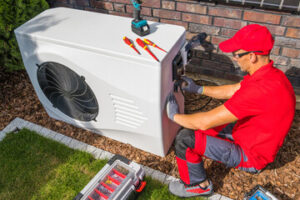What You Should Know About AC Installation
Getting a new air conditioner installed is an excellent investment in your home. It will help you save money on yearly energy costs. In addition, it will improve the overall comfort of your home. Before your installation team arrives, they should call or text you to let you know they’re on their way. This helps build a trusting relationship between you and the team.
The cost of AC Installation Los Angeles can vary depending on the type of AC system you choose. You may also want to consider the energy-efficiency rating of your new AC unit, as a high SEER rating will save you money in the long run. Additionally, some states and utility companies offer rebates for high-efficiency HVAC systems.
A central air conditioning system costs more to install than a ductless system, but it can be worth the investment in the long run. It will cool a larger area and reduce the risk of ice formation in colder climates. However, a large home will require more power to efficiently cool it, so you should consult with an experienced AC professional about your home’s cooling needs before you make a purchase.
Ductwork and other add-ons can increase the total cost of an AC installation. For example, a duct cleaning service can be costly, as can a ventilation system. The ductwork is a key part of an AC system, so you should have it checked for leaks and other problems before purchasing an air conditioner.
Other extras include a condenser pad, which costs between $40 and $250 and protects the outdoor unit from soil. A prefabricated composite or poured concrete pad is usually less expensive than a cinder block base. You should also budget for the cost of a new breaker box, which ranges from $150 to $300, and a new line set, which is about $100. You may also need to pay for a permit and Freon disposal, which will add to the overall cost of your installation.
An AC installation is often more complex and dangerous than homeowners think, so many hire a qualified HVAC technician to avoid costly mistakes. A licensed technician will inspect your property and assess the size of your AC system and ductwork. Then he or she will give you an estimate of the cost.
A good contractor will provide a fair price and guarantee his or her work, so you can feel confident about your investment. The best way to ensure you get a good deal is to shop around and gather quotes from several HVAC contractors. Make sure the quote includes all fees and charges, including any permits or Freon removal costs.
Energy efficiency
ACs used to be considered luxury appliances, but now they’re a necessity for most homeowners. Not only do they improve comfort, but they also increase home value and productivity. Fortunately, new air conditioners are significantly more energy-efficient than older units.
The key to maximizing the efficiency of an AC installation is proper design and installation. A skilled HVAC contractor will consider many factors, such as sizing the system for your cooling load (measured in BTUs per hour), ductwork, air sealing, and insulation. They will also use an air conditioning unit with a high SEER rating, which indicates how much less energy it uses to cool your house.
A new AC will save you money over time and cut your utility bills by reducing the amount of electricity your house consumes. In addition, new models use less refrigerant, which doesn’t pollute the ozone. As a result, they’re better for the environment than old ACs that use R-22 refrigerant, which is now illegal in most states.
When choosing an air conditioner, look for a model with a high SEER rating and a high COP (coefficient of performance). It should also be sized properly for your home, as well as have an air filter that’s easily accessible for annual cleaning. Also, make sure your new AC is located away from trees and other obstructions that can harbor moisture.
Energy efficiency is determined by a home’s energy consumption, which is measured in kilowatt-hours (kWh). It is also dependent on the size of the home and the desired level of comfort. A newer, more efficient air conditioner can cut your energy consumption by up to 40%, saving you both money and the environment.
When considering an AC installation, be sure to check out the local government’s rebate programs. These may help offset the initial cost of the equipment as well as the installation fee. You should also inquire about any special energy-efficiency features that may be available. For example, some companies offer zoning systems that allow you to cool certain rooms at different times. This can significantly reduce your energy costs and help the environment.
Installation process
A new air conditioning system is a major investment. You want to ensure that it is properly installed so it can meet your family’s cooling needs for many years to come. A professional HVAC company will follow the proper installation process for your safety and comfort. They’ll also make sure that all of the electrical and ductwork connections are made correctly. In addition, they’ll add refrigerant to the system and test it to make sure it’s working correctly.
When the installation team arrives, they’ll first introduce themselves to you. This may seem like an insignificant step, but it helps establish rapport and makes the whole experience less stressful for everyone involved. They’ll then lay down drop cloths to protect your floors and other surfaces, and they’ll start laying out tools and equipment. Then they’ll begin installing the new AC unit.
One of the most important steps in the installation process is recovering any remaining refrigerant from your old unit. This is done by a professional who has an EPA refrigerant handling certification and knows how to safely remove it from your existing AC unit. This is something that you should not attempt on your own, as it can be very dangerous.
Once all of the connections are made, they’ll add refrigerant and test your new air conditioner. They’ll also check the airflow and adjust any settings as needed. A new AC system should be sized appropriately to maximize energy efficiency and performance. This is determined by the square footage of your home and how many BTUs it needs per hour.
A new air conditioner is a large investment, so you’ll want to find a reputable and reliable installer. You can look for local contractors who have a reputation for quality service and are licensed and insured. They should be able to answer your questions and give you an idea of how much the project will cost. Some companies will even provide a free estimate for their services. However, be wary of any contractor who will try to cut corners or take shortcuts during the installation process. This could jeopardize the safety and function of your air conditioning system, which will end up costing you more money in the long run.
Warranty
The warranty offered by the manufacturer of your new HVAC system is a good starting point for determining how much protection you’ll get when it comes to repairs and replacement parts. However, there are a few things that can invalidate this warranty. One of the most common is damage caused by severe weather events such as floods, lightning strikes, and power surges. These circumstances are generally covered by your homeowners insurance policy (though it’s always best to check with the insurer to be sure).
Another thing that can void your warranty is installing off-brand or non-compatible components. This can lead to mechanical problems, shortened equipment lifespans, and outright failure of the unit. Using off-brand parts may also cost you more in the long run. This is why it’s important to use only factory-certified and approved components from a reputable manufacturer.
You can find out more about the warranty on your HVAC system by looking up the manufacturer online. Many manufacturers provide this information, as well as their product manuals, on their websites. To find this information, you will need the serial number of your new AC. This is usually a number that is printed on the front of the unit. You can usually find this number yourself, but if you aren’t able to do so, your installer should be able to help you.
Most warranties include a parts and labor warranty. The parts warranty covers the cost of replacing the damaged part. The labor warranty covers the cost of the repair work performed to replace the part. The two warranties work together to protect your investment in your HVAC system.
Manufacturers tend to offer better warranties on their equipment than they do on their installation services, so it’s important to choose an HVAC company that stands behind its products and is confident in its ability to install them properly. A quality HVAC contractor will typically offer a written 100 percent money-back guarantee on their work and a warranty that matches that of the manufacturer.
The warranty that accompanies your HVAC system can be confusing. There are various types of warranties available, and each has its own set of requirements. For example, most manufacturers require that you have a professional perform regular maintenance on your system. This is necessary to keep your warranty valid, and it helps ensure the longevity of your equipment.





